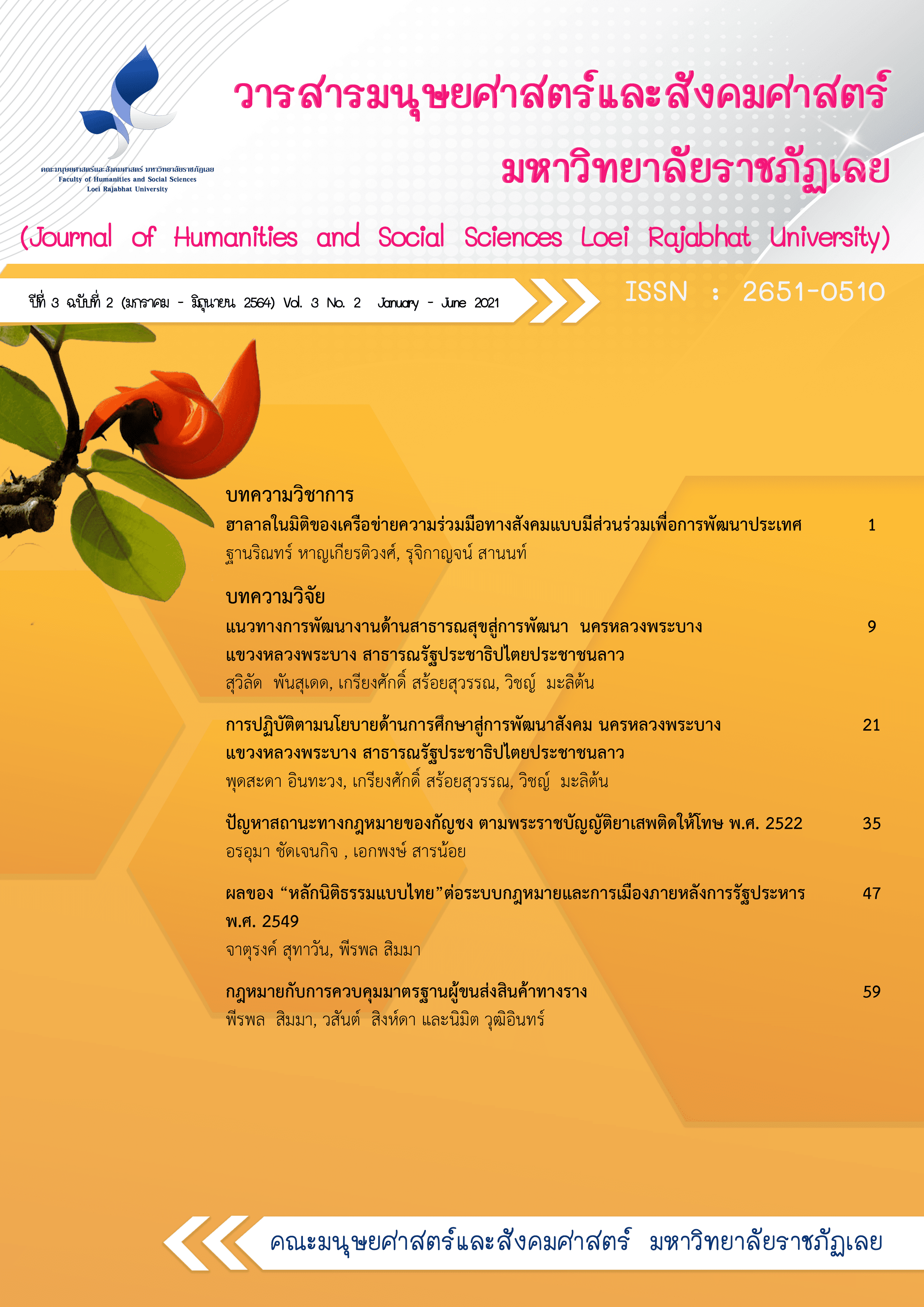The effect of "Thai Rule of Law" on the legal and political systems after the 2006 coup.
Keywords:
Rule of Law, Law, Coup d'etatAbstract
This research has the objective To study Effects of the "Thai Rule of Law" on the legal and political system after the 2006 coup. This research is a qualitative research. It is a descriptive research study using documentary research, which is published in the form of documents and information published in electronic format.
The results of the research were as follows: The Thai rule of law is characterized by driving the history of Thai law. With a methodology according to the traditions of lawyers that are linked to the elite without giving priority to critique of legal history but this principle emphasizes the role of the legal community in connection with the ruling class. Until sending the history of Thai law to be dominated by the history of Royalism. Which play an important role in creating a wide range of legal exemption conditions Law has therefore become the only tool of the person who has the power to govern the country. Until it makes the rule of law that is an essential element of the legal system that is unique As for the impact of the rule of law in the Thai legal system on the political system after the coup of 2011 2006 is characterized by the following concepts: (1) Thai rule of law It facilitates the urge for elite institutions to be one on top the powers in the Thai political system (2) The rule of law in Thai law has been exaggerated as an exalted position. And the checks and balances were difficult to perform.
References
กฤษณ์พชร โสมณวัตร. “การประกอบสร้างอานาจตุลาการในสังคมไทยสมัยใหม่.” ดุษฎีนิพนธ์ ปรัชญาดุษฎีบัณฑิต สาขาประวัติศาสตร์ คณะมนุษยศาสตร์ มหาวิทยาลัยเชียงใหม่, 2562.
กมลวรรณ ชื่นชูใจ. (2563) ความคิด “ปีศาจ”: นิติราษฎร์, พรรคอนาคตใหม่, กับการสร้างการเมืองแห่งความหวัง: CMU Journal of Law and Social Sciences. ปีที่ 13 ฉบับที่ 2 (2020): กรกฎาคม - ธันวาคม 2563
ธงชัย วินิจจะกุล.(2563) ปาฐกถาพิเศษ ป๋วย อึ้งภากรณ์ ครั้งที่ 17 เรื่องนิติรัฐอภิสิทธิ์ ราชนิติธรรม ประวัติศาสตร์ภูมิปัญญา rule by law วันที่ 9 มีนาคม 2563 ณ หอประชุมมหาวิทยาลัยธรรมศาสตร์ รังสิต.
ประมุข บัณฑุกุล และศิวัช ศรีโภคางกุล.(2560).บทบาทของศาลรัฐธรรมนูญท่ามกลางความขัดแย้งทางการเมือง.วิทยานิพนธ์มหาบัณฑิต.มหาวิทยาลัยขอนแก่น
ปิยบุตร แสงกนกกุล.(2562).ศาลรัฐประหาร : ตุลาการ ระบอบเผด็จการ และนิติรัฐประหาร:
กรุงเทพฯ.ฟ้าเดียวกัน
วรเจตน์ ภาคีรัตน์.(2558).ด้วยกฎหมายและอุดมการณ์.กรุงเทพฯ.shine publishing.
วรเจตน์ ภาคีรัตน์ (2564) ประวัติศาสตร์ความคิดนิติปรัชญา. กรุงเทพ. อ่านกฎหมาย
Jackson, Peter A. “The Thai Regime of Image.” Sojourn: Journal of Social Issues in Southeast Asia 19, no. 2 (October 2004): 181-218.
Bourdieu, P. (1995). Outline of a Theory of Practice. (R. Nice Trans.). Cambridge: Cambridge University. (Original work published 1977)
Ran Hirschl, “The New Constitution and the Judicialization of Pure Politics Worldwide,”Fordham Law Review 75, 2 (2006) :721-53; Ran Hirschl, The Judicialization of Mega-Politics and the Rise of Political Courts,” Annual Review of Political science 11 (2008) :93-118
Downloads
Published
Versions
- 2023-02-27 (2)
- 2021-06-30 (1)








